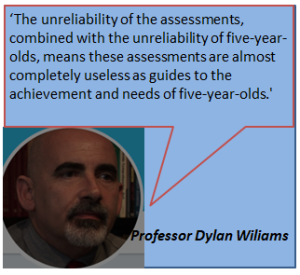
by Sue Palmer
 “Back in the 1980s,” wrote Professor Peter Moss in Nursery World 30-9-24, “Loris Malaguzzi, the great Italian early childhood educator, warned of the spread of what he called ‘Anglo-Saxon testology’ which is ‘nothing but a ridiculous simplification of knowledge, and a robbing of meaning from individual histories’.”
“Back in the 1980s,” wrote Professor Peter Moss in Nursery World 30-9-24, “Loris Malaguzzi, the great Italian early childhood educator, warned of the spread of what he called ‘Anglo-Saxon testology’ which is ‘nothing but a ridiculous simplification of knowledge, and a robbing of meaning from individual histories’.”
Professor Moss is worried that the OECD is now spreading this ‘ridiculous simplification’ via its International Early Learning and Child Well-Being Study (IELS), due to publish a final report in 2026. The purpose, validity and reliability of IELS have been widely questioned by early years researchers – apart from anything else, the study isn’t particularly international: only three countries were prepared to sign up (and pay) to participate in the first round of assessment, and only eight in the second. And only one country has participated in both rounds: England.
Anglo-Saxon attitudes
The OECD has not responded to the criticisms. Neither have the Anglo-Saxon testology experts at England’s Department for Education (although the new Labour government has apparently decided to continue commitment to the IELS project). Presumably the DfE hopes the project will back up England’s early years policies, which include testing children’s literacy and numeracy skills on admission to primary school at age four or five, then testing their skill at phonic decoding a year later. Regular national standardised assessment then continues until, at age sixteen, students embark on a roller-coaster of public examinations that will determine their future in society.
However, let’s keep the focus on early years. As in Scotland, EY provision in England is in a state of crisis (see another Nursery World article, on 4-10-24). At the same time, social, emotional and other developmental problems in young children are massively on the rise. To someone who’s been researching this stuff for over a quarter of a century, it’s long been obvious that a growing obsession with ‘Anglo-Saxon testology’ has coincided with significant decline in children’s social and emotional well-being.
Of course policy-makers need reliable data on which to base policy decisions (for instance, the recent steep rise in young children’s speech and language problems) but practitioners on the ground then need practical support to solve those problems (i.e. immediate and ongoing assistance from speech and language therapists). Unfortunately, when so much tax-payers’ money is being spent on staff at government offices to commission, collect and collate endless quantities of data, there’s very little left over to employ speech and language therapists… or learning support assistants in schools … or enough early years practitioners in nurseries …
Data and the attainment gap
 Ten years ago, the Scottish government devised a twelve-point plan for closing the poverty-related attainment gap in Scottish schools. Earlier this week, James McEnaney (Education Correspondent for the Herald) estimated they’d spent around three-quarters of a billion pounds pursuing it – and the poverty gap is as wide as ever. A great deal of that £750,000, 000 has been spent on commissioning and administering Scottish National Standardised Assessments for five-year-olds in literacy and numeracy, despite the advice of experts in assessment and early years that this is developmentally inappropriate and a waste of time.
Ten years ago, the Scottish government devised a twelve-point plan for closing the poverty-related attainment gap in Scottish schools. Earlier this week, James McEnaney (Education Correspondent for the Herald) estimated they’d spent around three-quarters of a billion pounds pursuing it – and the poverty gap is as wide as ever. A great deal of that £750,000, 000 has been spent on commissioning and administering Scottish National Standardised Assessments for five-year-olds in literacy and numeracy, despite the advice of experts in assessment and early years that this is developmentally inappropriate and a waste of time.
Much more cash has been used to develop and administer local authority tracking procedures, so that each individual child’s ‘progress’ is recorded in detail at County Hall. Not only does this mean that there’s little money left over for luxuries like speech and language therapists; it also means that practitioners have to waste hours making notes and filling in record sheets when they could have been observing or working with the children.
Rockets versus children
 Information technology has in many ways been a boon and a blessing for the human race, but it’s also been a massive – and very expensive – distraction for policy-makers, especially those who are already infected with the ‘Anglo-Saxon testology’ virus. Earlier this week, Pam Jarvis tweeted a Guardian article about yet another way the wonderful but sadly short-lived Sure Start initiative has proved itself a worthwhile investment. “Surely this isn’t rocket science,” she said.
Information technology has in many ways been a boon and a blessing for the human race, but it’s also been a massive – and very expensive – distraction for policy-makers, especially those who are already infected with the ‘Anglo-Saxon testology’ virus. Earlier this week, Pam Jarvis tweeted a Guardian article about yet another way the wonderful but sadly short-lived Sure Start initiative has proved itself a worthwhile investment. “Surely this isn’t rocket science,” she said.
“You know, Pam,” I tweeted back, “I think the point is that it ISN’T rocket science. Policy-makers find rocket science interesting and impressive because it’s about systems and power. They don’t find developmental science interesting because it’s about relationships and care.”
I’m rather proud of that tweet because it summed up something I’d been trying to articulate for a long time. I fear that our culture isn’t just distracted by data – education and our other public services are currently drowning in it. When – if ever – will policy-makers recognise that society can’t function unless relationships and care are prioritised over data-collection and number-crunching?


